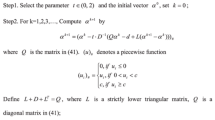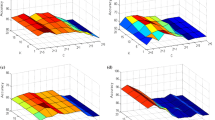Abstract
Twin support vector machines (TWSVM) and the improved version of it, twin bounded support vector machines (TBSVM), are based on the idea of constructing two-class proximal hyperplanes placed at least unit relative distance away from the opposite class data samples. Both inherently possess outlier and noise sensitivity which is common in most of the traditional machine learning classification algorithms. Intuitionistic fuzzy twin support vector machines (IFTSVM), on the other hand, apply the concept of fuzzy membership determined in the same feature space as the mapped input. However, IFTSVM utilizes the fuzzy membership values only for those opposite class samples that violate the constraint that they have to be at a minimum of unit distance from the class proximal hyperplane. IFTSVM does not consider the proximal terms of the objective functions which also are affected by outliers and noise. This work studies incorporating intuitionistic fuzzy membership to the proximal terms of the objective functions that ensure the class hyperplanes are derived at minimal proximity. Furthermore, the proposed work employs cost-sensitive learning so that the error cost of each class is balanced even in case of datasets with high imbalance ratio. Experimental study proves the effectiveness of the proposed algorithm.
Access this chapter
Tax calculation will be finalised at checkout
Purchases are for personal use only
Similar content being viewed by others
References
Cortes, C., Vapnik, V.: Support-vector networks. Mach. Learn. 20(3), 273–297 (1995)
Suykens, J.A., Vandewalle, J.: Least squares support vector machine classifiers. Neural Process. Lett. 9(3), 293–300 (1999)
Mangasarian, O.L., Musicant, D.R.: Lagrangian support vector machines. J. Mach. Learn. Res. 1, 161–177 (2001)
Jayadeva, Khemchandani, R., Chandra, S.: Twin support vector machines for pattern classification. IEEE Trans. Pattern Anal. Mach. Intell. 29(5), 905–910 (2007)
Shao, Y.H., Zhang, C.H., Wang, X.B., Deng, N.Y.: Improvements on twin support vector machines. IEEE Trans. Neural Netw. 22(6), 962–968 (2011)
Lin, C.F., Wang, S.D.: Fuzzy support vector machines. IEEE Trans. Neural Netw. 13(2), 464–471 (2002)
Wang, Y., Wang, S., Lai, K.K.: A new fuzzy support vector machine to evaluate credit risk. IEEE Trans. Fuzzy Syst. 13(6), 820–831 (2005)
Liu, J., Zio, E.: A scalable fuzzy support vector machine for fault detection in transportation systems. Expert Syst. Appl. 102, 36–43 (2018)
Chen, S.G., Wu, X.J.: A new fuzzy twin support vector machine for pattern classification. Int. J. Mach. Learn. Cybern. 9(9), 1553–1564 (2018)
Borah, P., Gupta, D., Prasad, M.: Improved 2-norm based fuzzy least squares twin support vector machine. In: 2018 IEEE Symposium Series on Computational Intelligence (SSCI), pp. 412–419. IEEE (2018)
Chen, S., Cao, J., Huang, Z., Shen, C.: Entropy-based fuzzy twin bounded support vector machine for binary classification. IEEE Access 7, 86555–86569 (2019)
Rezvani, S., Wang, X., Pourpanah, F.: Intuitionistic fuzzy twin support vector machines. IEEE Trans. Fuzzy Syst. 27(11), 2140–2151 (2019)
Fan, Q., Wang, Z., Li, D., Gao, D., Zha, H.: Entropy-based fuzzy support vector machine for imbalanced datasets. Knowl.-Based Syst. 115, 87–99 (2017)
Tao, X., Li, Q., Ren, C., Guo, W., He, Q., Liu, R., Zou, J.: Affinity and class probability-based fuzzy support vector machine for imbalanced data sets. Neural Netw. 122, 289–307 (2020)
Borah, P., Gupta, D.: Robust twin bounded support vector machines for outliers and imbalanced data. Appl. Intell. 1–30 (2021)
Chawla, N.V., Bowyer, K.W., Hall, L.O., Kegelmeyer, W.P.: SMOTE: synthetic minority over-sampling technique. J. Artif. Intell. Res. 16, 321–357 (2002)
Douzas, G., Bacao, F.: Geometric SMOTE a geometrically enhanced drop-in replacement for SMOTE. Inf. Sci. 501, 118–135 (2019)
Fernández, A., Garcia, S., Herrera, F., Chawla, N.V.: SMOTE for learning from imbalanced data: progress and challenges, marking the 15-year anniversary. J. Artif. Intell. Res. 61, 863–905 (2018)
Pan, T., Zhao, J., Wu, W., Yang, J.: Learning imbalanced datasets based on SMOTE and Gaussian distribution. Inf. Sci. 512, 1214–1233 (2020)
Ha, M., Wang, C., Chen, J.: The support vector machine based on intuitionistic fuzzy number and kernel function. Soft. Comput. 17(4), 635–641 (2013)
Bache, K., Lichman, M.: UCI machine learning repository (2013)
Alcalá-Fdez, J., Sanchez, L., Garcia, S., del Jesus, M.J., Ventura, S., Garrell, J.M., Otero, J., Romero, C., Bacardit, J., Rivas, V.M., Fernández, J.C.: KEEL: a software tool to assess evolutionary algorithms for data mining problems. Soft. Comput. 13(3), 307–318 (2009)
Tay, F.E., Cao, L.: Application of support vector machines in financial time series forecasting. Omega 29(4), 309–317 (2001)
Kim, K.J.: Financial time series forecasting using support vector machines. Neurocomputing 55(1–2), 307–319 (2003)
Huang, Z., Chen, H., Hsu, C.J., Chen, W.H., Wu, S.: Credit rating analysis with support vector machines and neural networks: a market comparative study. Decis. Support Syst. 37(4), 543–558 (2004)
Kavzoglu, T., Colkesen, I.: A kernel functions analysis for support vector machines for land cover classification. Int. J. Appl. Earth Obs. Geoinf. 11(5), 352–359 (2009)
Author information
Authors and Affiliations
Editor information
Editors and Affiliations
Rights and permissions
Copyright information
© 2022 The Author(s), under exclusive license to Springer Nature Singapore Pte Ltd.
About this paper
Cite this paper
Borah, P., Phukan, R., Chunka, C. (2022). Twin Support Vector Machines Classifier Based on Intuitionistic Fuzzy Number. In: Mishra, D., Buyya, R., Mohapatra, P., Patnaik, S. (eds) Intelligent and Cloud Computing. Smart Innovation, Systems and Technologies, vol 286. Springer, Singapore. https://doi.org/10.1007/978-981-16-9873-6_34
Download citation
DOI: https://doi.org/10.1007/978-981-16-9873-6_34
Published:
Publisher Name: Springer, Singapore
Print ISBN: 978-981-16-9872-9
Online ISBN: 978-981-16-9873-6
eBook Packages: Intelligent Technologies and RoboticsIntelligent Technologies and Robotics (R0)




